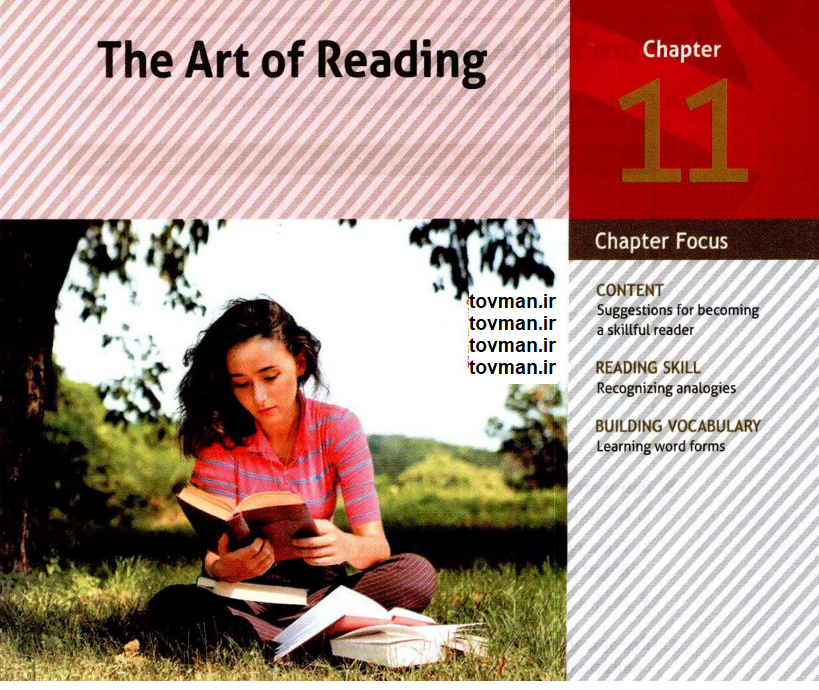
The Art of Reading by Lin Yu T'ang from The Importance of Understanding
هنر خواندن توسط لین یو تانگ از اهمیت فهمیدن
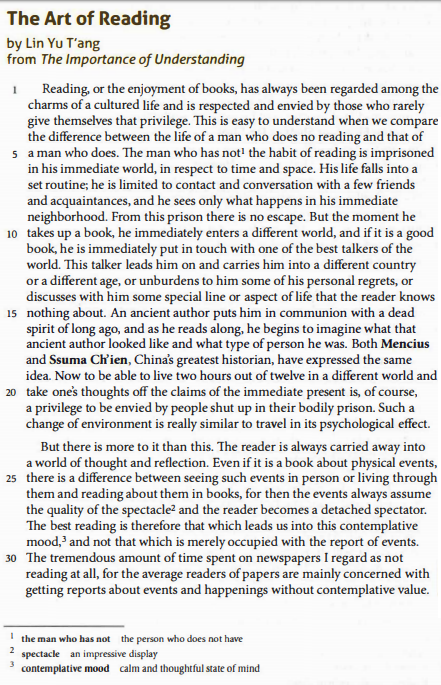
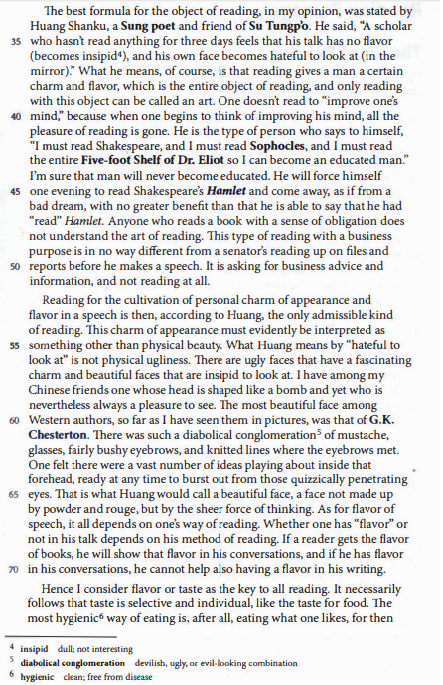
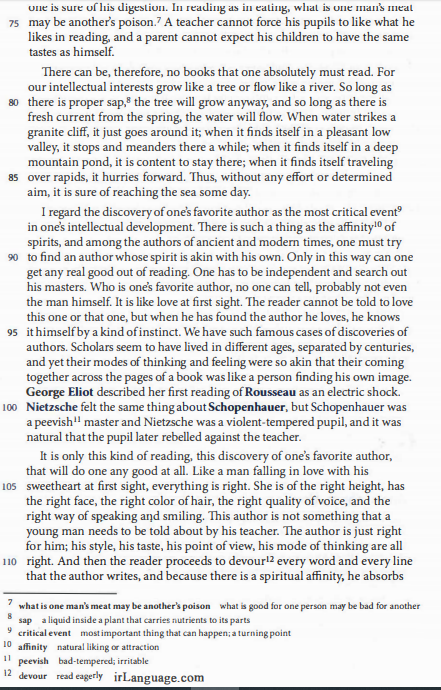
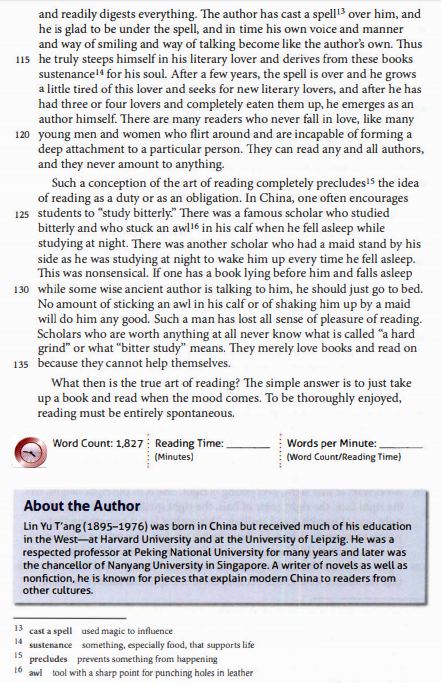
Reading, or the enjoyment of books, has always been regarded among the charms of a cultured life and is respected and envied by those who rarely give themselves that privilege. This is easy to understand when we compare the difference between the life of a man who does no reading and that of a man who does. The man who has not۱ the habit of reading is imprisoned in his immediate world, in respect to time and space. His life falls into a set routine; he is limited to contact and conversation with a few friends and acquaintances, and he sees only what happens in his immediate neighborhood. From this prison there is no escape.
خواندن، یا لذت بردن از کتاب، همواره در میان جذابیت های یک زندگی فرهنگی مورد توجه بوده و مورد احترام و حسادت کسانی است که بندرت چنین امتیازی را به خود می دهند. و این به آسانی با مقایسه زندگی شخصی که مطالعه می کند و شخصی که مطالعه نمی کند، قابل فهم است. مردی که عادت به خواندن ندارد، با توجه به زمان و مکان، در دنیای نزدیک خود زندانی می شود. زندگی او در یک روال معمول قرار می گیرد. او محدود به تماس و مکالمه با چند دوست و آشنای است و او فقط آنچه را که در مجاورت اوست، می بیند و از این زندان راه فراری نیست.
But the moment he takes up a book, he immediately enters a different world, and if it is a good book, he is immediately put in touch with one of the best talkers of the world. This talker leads him on and carries him into a different country or a different age, or unburdens to him some of his personal regrets, or discusses with him some special line or aspect of life that the reader knows nothing about. An ancient author puts him in communion with a dead spirit of long ago, and as he reads along, he begins to imagine what that ancient author looked like and what type of person he was. Both Mencius and Ssuma Ch'ien, China's greatest historian, have expressed the same idea. Now to be able to live two hours out of twelve in a different world and take one's thoughts off the claims of the immediate present is, of course, a privilege to be envied by people shut up in their bodily prison. Such a change of environment is really similar to travel in its psychological effec
اما لحظه ای که کتاب را بر می دارد، بلافاصله وارد دنیای دیگری می شود و اگر آن کتاب خوب باشد، بی درنگ در تماس با یکی از بهترین گویندگان دنیا قرار می گیرد. این گوینده او را هدایت می کند و او را به کشوری دیگر، یا به سن متفاوتی منتقل می کند، یا از بعضی تاسف های شخصی اش با او درد دل می کند یا سطر ها و جنبه های خاصی از زندگی را با او در میان می گذارد که خواننده چیزی در مورد آنها نمی داند. یک نویسنده باستان او را در ارتباط با روح یک مرده در زمان های خیلی دور قرار می دهد و همانطور که او به خواندن ادامه می دهد، شروع به تصور اینکه نویسنده باستان چه شکلی بوده و چه نوع شخصیتی داشته است، می کند. بزرگترین مورخان چین منسیوس و اسوما چینا همین ایده را ابراز کرده اند. حالا می توانیم دو ساعت از دوازده ساعت را در یک دنیای دیگر زندگی کنیم و تفکر خو د را از زمان نزدیک عبور دهیم، البته این امتیازی است که به وسیله افرادی که در زندان بدنشان حبس شده اند، مورد حسادت قرار می گیرد. چنین تغییر محیطی در اثر روانشناختی آن، واقعاً شبیه مسافرت است.
But there is more to it than this. The reader is always carried away into a world of thought and reflection. Even if it is a book about physical events, there is a difference between seeing such events in person or living through them and reading about them in books, for then the events always assume the quality of the spectacle۲ and the reader becomes a detached spectator. The best reading is therefore that which leads us into this contemplative mood,and not that which is merely occupied with the report of events. The tremendous amount of time spent on newspapers I regard as not reading at all, for the average readers of papers are mainly concerned with getting reports about events and happenings without contemplative value
اما چیزی بیشتر از این وجود دارد. خواننده همواره به دنیایی از تفکر و اندیشه منتقل می شود. حتی اگر کتابی در مورد وقایع طبیعی باشد، بین دیدن آن وقایع بطور شخصی یا بواسطه آنها زندگی کردن با خواندن در مورد آنها در کتاب ها تفاوت وجود دارد، در این صورت، این حوادث همواره کیفیت نمایش را نشان می دهد و خواننده به تماشگر مستقل تبدیل می شود. بنابر این بهترین خواندن، آن چیزی است که ما را به سمت این حالت متفکرانه سوق می دهد، و نه آنچه که صرفاً با گزارشی از وقایع پر شده است. مقدار خیلی زیادی از وقت که صرف خواندن روزنامه ها می شود به نظر من اصلاً خواندن محسوب نمی شود، خوانندگان معمولی عمدتاً نگران دریافت گزارشاتی در مورد وقایع و اتفاقات هستند، بدون اینکه هیچ ارزش متفکرانه ای داشته باشد.
The best formula for the object of reading, in my opinion, was stated by Huang Shanku, a Sung poet and friend of Su Tungp,o. He said, "A scholar who hasn't read anything for three days feels that his talk has no flavor (becomes insipid۴), and his own face becomes hateful to look at (in the mirror):' What he means, of course, is that reading gives a man a certain charm and flavor, which is the entire object of reading, and only reading with this object can be called an art. One doesn't read to "improve one's mind;' because when one begins to think of improving his mind, all the pleasure of reading is gone
به نظر من بهترین فرمول برای موضوع خواندن توسط هوانگ شانکو، شاعر سونگ و دوست سوتونگپو بیان شده است. وی گفت: "دانشمندی که سه روز هیچ چیزی را نخوانده است، احساس می کند که صحبتهای او هیچ طعم و مزه ای ندارد (ناخوشایند می شود) و متنفر می شود که به چهره خود نگاه کند (در آینه): منظور او چیست. منظور او این است که خواندن به انسان جذابیت و طعم خاصی می بخشد، که تماماً هدف خواندن است و فقط خواندن با این هدف می تواند یک هنر نامیده شود. شخص نمی خواند "ذهن خود را بهبود بخشد ؛" زیرا وقتی کسی به فکر بهبود ذهن خود می افتد، تمام لذت خواندن از بین می رود.
He is the type of person who says to himself, I must read Shakespeare, and I must read Sophocles, and I must read the entire Five-foot Shelf of Dr. Eliot so I can become an educated man:' I'm sure that man will never become educated. He will force himself one evening to read Shakespeare's Hamlet and come away, as if from a bad dream, with no greater benefit than that he is able to say that he had read" Hamlet. Anyone who reads a book with a sense of obligation does not understand the art of reading. ۱his type of reading with a business purpose is in no way different from a senator's reading up on files and so reports before he makes a speech. It is asking for business advice and information, and not reading at all
او از آن نوع شخصیت هاست که با خودش می گوید، من باید شکسپیر و سوفوکلز و پنج قفسه کامل دکتر الیوت را بخوانم تا انسان فرهیخته ای شوم. من مطمئنم که او هرگز فرهیخته نخواهد شد. او خود را مجبور خواهد کرد که در یک عصر هملت شکسپیر را بخواند، تا فقط بتواند بگوید که هملت را خوانده است؛ گویی از یک رویای بد بدون فایده جدا شده است. هر کس کتابی را با اجبار بخواند هنر خواند را درک نمی کند. این نوع خواندن با هدف تجاری، به هیچ وجه تفاوتی با خواندن پرونده ها توسط یک سناتور برای ارائه گزارشات قبل از یک سخنرانی ندارد. این درخواست مشاوره و اطلاعات شغلی است و به هیچ وجه مطالعه نیست.
Reading for the cultivation of personal charm of appearance and flavor in a speech is then, according to Huang, the only admissible kind of reading. This charm of appearance must evidently be interpreted as something other than physical beauty. What Huang means by "hateful to look at" is not physical ugliness. There are ugly faces that have a fascinating charm and beautiful faces that are insipid to look at. I have among my Chinese friends one whose head is shaped like a bomb and yet who is nevertheless always a pleasure to see.
مطابق نظر هوانگ، خواندن برای پرورش جذابیت شخصی ظاهر و عطر طعم دادن به گفتار، تنها نوع قابل قبول خواندن است. بدیهی است که این جذابیت ظاهری باید غیر از زیبایی جسمی تعبیر شود. منظور هوانگ از "منفور برای نگاه کردن" زشتی جسمانی نیست. چهر های زشتی وجود دارد که جذابیتی دلربا دارند و چهره های زیبایی هستند که نگاه کردن به آنها ملامت بار است. من در میان دوستان چینی خود دوستی دارم که سرش شبیه بمب است با این وجود دیدارش همیشه خوشایند است.
The most beautiful face among Western authors, so far as I have seen them in pictures, was that of G.K. Chesterton. There was such a diabolical conglomeration۵ of mustache, glasses, fairly bushy eyebrows, and knitted lines where the eyebrows met.One felt there were a vast number of ideas playing about inside that forehead, ready at any time to burst out from those quizzically penetrating eyes. That is what Huang would call a beautiful face, a face not made up by powder and rouge, but by the sheer force of thinking. As for flavor of speech, it all depends on one's way of reading. Whether one has "flavor" or not in his talk depends on his method of reading. If a reader gets the flavor of books, he will show that flavor in his conversations, and if he has flavor in his conversations, he cannot help also having a flavor in his writing.
زیباترین چهره ای که من میان نویسندگان غربی تاکنون دیده ام، جی کی چسترتون است. ترکیب و ریخت اهریمنی از سبیل، عینک، ابروهای نسبتاً پرپشت و خطوط پیوسته که با ابروها تلاقی می کند. احساس می کنی که تعداد زیادی ایده در درونش بازی می کند که در هر زمانی، پیشانیش آماده است تا آنها را از آن چشمهای نافذ بیرون بریزد. این همان چهره ای است که هوانگ یک چهره زیبا می نامد، آن چهره ای نیست که با پودر و سرخاب آرایش شده باشد، بلکه با نیروی تفکر محض ساخته شده است. در مورد خوش بیانی و عطر و طعم ، همه آن به روش خواندن فرد بستگی دارد. این که شخص در گفتارش خوش بیان هست یا نه بستگی به روش خواندن او دارد. اگر یک خواننده خوش بیانی و عطر و طعم کتاب ها را کسب کند، او آن خوش بیانی و عطر و طعم را در مکالمات خود نشان می دهد، و اگر او در مکالماتش خوش بیان است او نمی تواند در نوشتارش هم این خوش بیانی و عطر و طعم را داشته باشد.
Hence I consider flavor or taste as the key to all reading. It necessarily follows that taste is selective and individual, like the taste for food. The most hygienic۶ way of eating is, after all, eating what one likes, for then one is sure of his digestion. In reading as in eating, what is one man's meat may be another's poison. A teacher cannot force his pupils to like what he likes in reading, and a parent cannot expect his children to have the same tastes as himself
از این رو من طعم یا مزه را کلید همه خواندن ها می دانم. لزوماً آن مزه انتخابی و فردی است، شبیه طعم غذا. بهداشتی ترین روش غذا خوردن، خوردن چیزی است که شخص دوست دارد. زیرا در این صورت است که فرد به هضم خود اطمینان دارد. در خواندن همانند خوردن، آنچه که برای فردی مفید است برای فرد دیگری ممکن است سم باشد. یک معلم نمی تواند شاگردش را مجبور کند که آنچه او برای خواندن دوست دارد، شاگردش هم دوست داشته باشد و والدین نمی توانند از فرزندان خود انتظار داشته باشند، همان ذائقه ای که آنها دارند را داشته باشند.
There can be, therefore, no books that one absolutely must read. For our intellectual interests grow like a tree or flow like a river. So long as there is proper sap, the tree will grow anyway, and so long as there is fresh current from the spring, the water will flow. When water strikes a granite cliff, it just goes around it; when it finds itself in a pleasant low valley, it stops and meanders there a while; when it finds itself in a deep mountain pond, it is content to stay there; when it finds itself traveling over rapids, it hurries forward. Thus, without any effort or determined aim, it is sure of reaching the sea some day.
بنابر این، هیچ کتابی وجود ندارد که قطعاً باید خوانده شود.علایق فکری ما مانند درخت رشد می کند یا مانند رودخانه جاری می شود. تا زمانی که شیره گیاهی مناسب وجود داشته باشد، به هر حال این درخت رشد خواهد کرد و تا زمانی که جریان تازه چشمه وجود داشته باشد، آب جاری می شود. وقتی آب به یک صخره گرانیتی برخورد می کند، فقط در اطراف آن می چرخد. وقتی خود را در دره ای کم عمق باصفائی یافت، در آنجا متوقف می شود و گردش می کند. وقتی خود را در یک دریاچه عمیق در کوهستان یافت، به ماندن در آنجا راضی است. وقتی متوجه می شود که در تند آبها سفر می کند، به سرعت پیش می رود. بنابراین، بدون هیچ گونه تلاش یا هدف مشخص، مطمئناً روزی به دریا خواهد رسید.
I regard the discovery of one's favorite author as the most critical event in one's intellectual development. There is such a thing as the affinity of spirits, and among the authors of ancient and modern times, one must try to find an author whose spirit is akin with his own. Only in this way can one get any real good out of reading. One has to be independent and search out his masters. Who is one's favorite author, no one can tell, probably not even the man himself. It is like love at first sight. The reader cannot be told to love this one or that one, but when he has found the author he loves, he knows it himself by a kind of instinct. We have such famous cases of discoveries of authors. Scholars seem to have lived in different ages, separated by centuries, and yet their modes of thinking and feeling were so akin that their coming together across the pages of a book was like a person finding his own image. George Eliot described her first reading of Rousseau as an electric shock. Nietzsche felt the same thing about Schopenhauer, but Schopenhauer was a peevish master and Nietzsce was a violent-tempered pupil, and it was natural that the pupil later rebelled against the teacher
کشف نویسنده مورد علاقه شخص را بحرانی ترین واقعه در رشد فکری شخص می دانم. چیزی به عنوان وابستگی ارواح وجود دارد و در میان نویسندگان دوران باستان و مدرن، باید تلاش کرد تا نویسنده هایی را پیدا کند که مشابه روح خودش باشد. فقط با این روش می توان کالای واقعی را برای خواندن بدست آورد. فرد باید مستقل باشد و استادان خود را جستجو کند. چه کسی نویسنده محبوب شخص است، هیچ کس نمی تواند بگوید او کیست، حتی خود شخص. همانند عشق در نگاه اول است. به خواننده نمی توان گفت که این یکی یا آن یکی را دوست داشته باش، اما وقتی نویسنده ای را که دوست دارد پیدا کرد، خودش آنرا با نوعی غریزه می شناسد. ما چنین موارد مشهوری از کشف نویسندگان را داریم. به نظر می رسد دانشمندان در سنین مختلفی زندگی کرده اند، قرن ها از هم جدا مانده اند، اما با این حال شیوه های تفکر و احساس آنها به قدری شبیه است که جمع شدن آنها در صفحات یک کتاب، مانند این است که شخصی تصویر خود را پیدا کند. جورج الیوت اولین خواندن خود در مورد روسو را یک شوک الکتریکی توصیف کرد. نیچه همین موضوع را در مورد شوپنهاور احساس می کرد، اما شوپنهاور یک استاد تندخو بود و نیچه یک شاگرد خشن بود و طبیعی بود که دانش آموز بعدا علیه معلم طغیان کند.
It is only this kind of reading, this discovery of one's favorite author, that will do one any good at all. Like a man falling in love with his sweetheart at first sight, everything is right. She is of the right height, has the right face, the right color of hair, the right quality of voice, and the right way of speaking arid smiling. This author is not something that a young man needs to be told about by his teacher. The author is just right for him; his style, his taste, his point of view, his mode of thinking are all right. And then the reader proceeds to devour every word and every line that the author writes, and because there is a spiritual affinity, he absorbs and readily digests everything.
فقط این نوع خواندن و کشف نویسنده مورد علاقه فرد است که هر خوبی را خواهد داشت. مانند مردی که در نگاه اول عاشق معشوقه اش می شود، همه چیز درست است. او قد مناسب، چهره اش خوب، رنگ موهای خوب، کیفیت صدای خوب و نحوه صحبت کردن و خندیدن خوبی دارد. این نویسنده کسی نیست که نیاز باشد به یک مرد جوان، توسط معلمش گفته شود. نویسنده درست برای اوست؛ سبکش، سلیقه اش، نقطه نظراتش، نحوه تفکرش همه درست است. و سپس خواننده پیش می رود تا هر کلمه و هر خطی که نویسنده می نویسد را ببلعد زیرا یک پیوند معنوی وجود دارد او همه چیز را جذب می کند و به راحتی هضم می کند.
The author has cast a spell over him, and he is glad to be under the spell, and in time his own voice and manner and way of smiling and way of talking become like the author's own. Thus he truly steeps himself in his literary lover and derives from these books sustenance for his soul. After a few years, the spell is over and he grows a little tired of this lover and seeks for new literary lovers, and after he has had three or four lovers and completely eaten them up, he emerges as an author himself. There are many readers who never fall in love, like many young men and women who flirt around and are incapable of forming a deep attachment to a particular person. They can read any and all authors, and they never amount to anything.
نویسنده او را جادو کرده است و او خوشحال است که جادو شده است و به مرور زمان صدا، نحوه لبخند زدن و شیوه فکر کردنش شبیه نویسنده اش می شود. بنابر این او حقیقتاً در معشوق ادبی خود فرو می رود و روح و روان او از این کتابها بهره می گیرد. بعد از چند سال طلسم شکسته می شود و او کمی از این معشوق خسته می شود و بدنبال معشوق ادبی جدیدی می گردد و پس از اینکه او سه یا چهار معشوق ادبی را کاملاً خورد، خود به عنوان یک نویسنده ظاهر می شود. خوانندگان زیادی وجود دارند که هرگز عاشق نمی شوند، مانند بسیاری از مردان و خانم های جوانی که در حول و حوش خود معاشقه می کنند ولی قادر به ایجاد دلبستگی عمیق به یک شخص خاص نیستند. آنها می توانند همه و هر نویسنده ای را بخوانند و هیچ وقت به چیزی نمی رسند.
Such a conception of the art of reading completely precludes۱۵ the idea of reading as a duty or as an obligation. In China, one often encourages students to "study bitterly:' There was a famous scholar who studied bitterly and who stuck an awl l۶ in his calf when he fell asleep while studying at night. There was another scholar who had a maid stand by his side as he was studying at night to wake him up every time he fell asleep. This was nonsensical. If one has a book lying before him and falls asleep while some wise ancient author is talking to him, he should just go to bed. No amount of sticking an awl in his calf or of shaking him up by a maid will do him any good. Such a man has lost all sense of pleasure of reading. Scholars who are worth anything at all never know what is called "a hard grind" or what "bitter study" means. They merely love books and read on because they cannot help themselves
چنین برداشتی از هنر خواندن بطور کامل مانع از اندیشه خواندن به عنوان یک وظیفه یا تکلیف می شود. در چین شخصی اغلب دانش آموزان را به شدت مطالعه کنند. دانشمند مشهوری وجود داشت که به شدت درس می خواند و هنگامیکه در شب موقع مطالعه خوابش می آمد، درفشی را پای خود فرو می کرد. دانشمند دیگری نیز وجود داشت که خدمتکاری در کنار خود داشت تا هر وقت هنگام مطالعه در شب خوابش برد او را بیدار کند. این مزخرف است. اگر کسی کتابی در جلویش داشته باشد و خوابش ببرد در حالیکه برخی از نویسندگان خردمند باستان با او صحبت می کنند ، بهتر است در همان دم به رختخواب برود. سوراخ کردن با درفش و تکان داده شدن با خدمتکار هیچ خیری برای او در پی نخواهد داشت. چنین شخصی تمام حس لذت خواندن را از دست داده است. دانشمندانی که ارزش هر چیزی را می دانند هرگز نمی دانند که سخت کار کردن و به شدت مطالعه کردن به چه معناست. آنها فقط کتاب را دوست دارند و می خوانند چون نمی توانند از خواندن دست بردارند
What then is the true art of reading? The simple answer is to just take up a book and read when the mood comes. To be thoroughly enjoyed, reading must be entirely spontaneous
پس هنر واقعی خواندن چیست؟ پاسخ ساده این است که فقط یک کتاب را بردارید و هر وقت حوصله داشتی و سر حال بودی آن را بخوان. بطور کامل باید لذت ببری، خواندن باید کاملاً خود جوش باشد.

